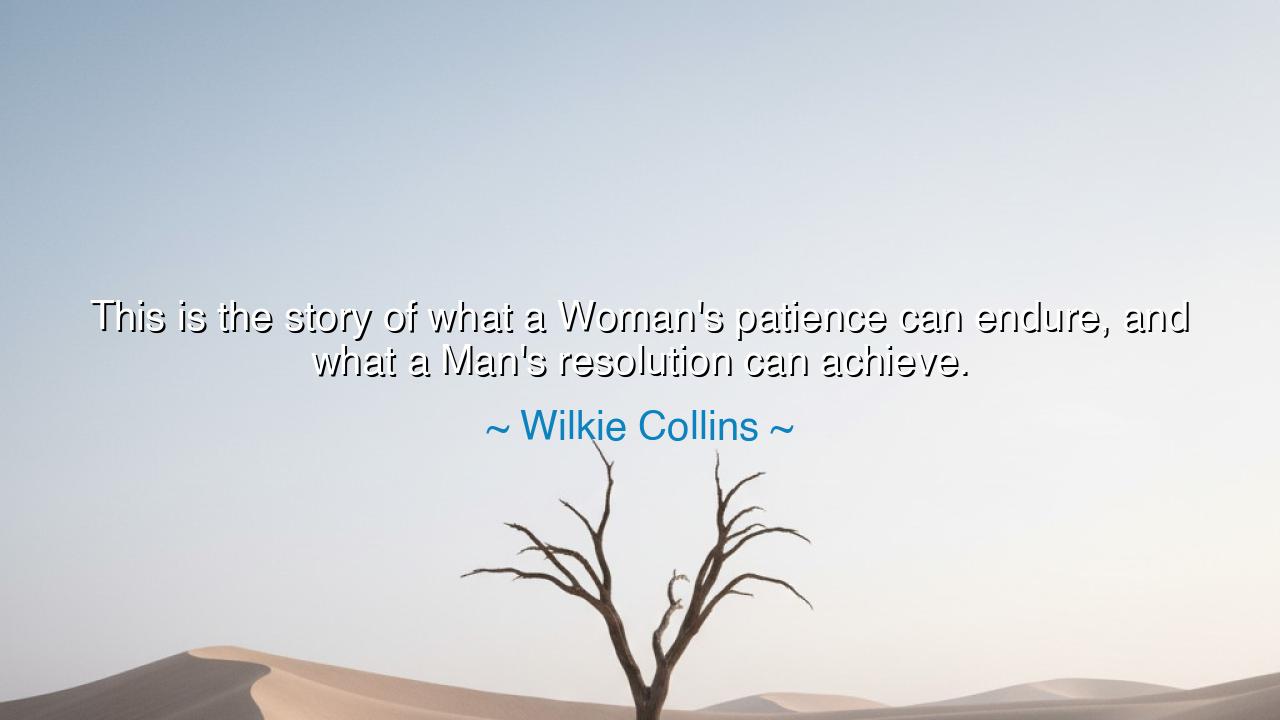
This is the story of what a Woman's patience can endure, and
This is the story of what a Woman's patience can endure, and what a Man's resolution can achieve.






Hear, O listeners, the solemn words of Wilkie Collins, master of mystery and drama, who declared: “This is the story of what a Woman's patience can endure, and what a Man's resolution can achieve.” These words, drawn from the opening of The Woman in White, frame a tale not only of intrigue but of the eternal balance between endurance and determination, between the silent strength of patience and the active power of resolve. In this duality lies the essence of human struggle, and the very rhythm by which great deeds and sacrifices are accomplished.
For Collins speaks of a Woman’s patience—a force too often dismissed, yet capable of bearing burdens that would break the strongest steel. Patience is not weakness; it is the slow fire that burns without ceasing, the quiet endurance of trial, suffering, and injustice until truth emerges. Women, bound in Collins’ age by social expectation and silence, often wielded patience as both shield and weapon. Their strength was not in sudden strikes, but in the long waiting, the persistence that outlasted tyranny and deceit.
Opposite stands a Man’s resolution, the force of action, the iron will that sets itself against adversity and moves forward without retreat. Where patience endures, resolution acts; where patience waits, resolution seizes. In Collins’ tale, these twin virtues entwine, each incomplete without the other. For endurance without resolution becomes mere suffering, and resolution without patience collapses at the first trial. Together, they form the whole of victory.
Consider, O listener, the story of Penelope, wife of Odysseus. For twenty long years she bore the burden of absence, fending off suitors with cunning and patience, weaving by day and unraveling by night, awaiting her husband’s return. Her endurance preserved their home. Meanwhile, Odysseus himself wandered the seas with resolution, braving storms, monsters, and gods to return to her. It was the union of her patience and his resolution that restored their household. Thus, ancient myth testifies to the truth Collins declared centuries later.
History, too, offers witness. Think of Nelson Mandela, who endured twenty-seven years of imprisonment with patience, yet never abandoned the resolution of his cause. His patience preserved his spirit; his resolution carried him into leadership. When he emerged, he achieved not vengeance but reconciliation, a feat only possible because patience and resolution lived side by side within him. Collins’ words, though born in the realm of fiction, echo in the real struggles of humanity.
What lesson, then, must we draw? That endurance and action are not enemies, but companions. Life demands both: the patience to suffer without breaking, and the resolution to act when the moment arrives. To cultivate one without the other is to walk half-armed into the trials of existence. Let women and men alike recognize these twin virtues as universal, not bound by gender, but by the call of circumstance and the demands of the soul.
Therefore, O seeker, carry this wisdom into your life: nurture patience when the road is long and the night unyielding, and ignite resolution when the dawn comes and action is required. Do not despise waiting, for it strengthens the heart; do not fear acting, for it fulfills the waiting’s purpose. As Collins declared, the great stories of our kind are written at the meeting of these two forces: the patience that endures, and the resolution that achieves. Only in their union do we find the strength to overcome the world.






AAdministratorAdministrator
Welcome, honored guests. Please leave a comment, we will respond soon